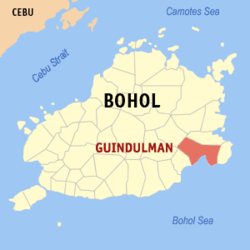Guindulman, Bohol
| Guindulman | |
|---|---|
| Municipality | |

Public market of Guindulman
|
|
 Map of Bohol with Guindulman highlighted |
|
| Location within the Philippines | |
| Coordinates: 9°46′N 124°29′E / 9.77°N 124.48°ECoordinates: 9°46′N 124°29′E / 9.77°N 124.48°E | |
| Country | Philippines |
| Region | Central Visayas (Region VII) |
| Province | Bohol |
| District | 3rd district of Bohol |
| Founded | before 1622 |
| Barangay |
19 (see § Barangays)
|
| Government | |
| • Type | Sangguniang Bayan |
| • Mayor | Albino Balo (PDP–Laban) |
| • Vice mayor | Ma Fe Piezas |
| • Town Council |
Members
|
| • Representative | Arthur Yap |
| Area | |
| • Total | 179.17 km2 (69.18 sq mi) |
| Population (2015 census) | |
| • Total | 32,408 |
| • Density | 180/km2 (470/sq mi) |
| • Voter (2016) | 20,529 |
| Time zone | PST (UTC+8) |
| ZIP code | 6310 |
| IDD : area code | +63 (0)38 |
| Income class | 4th class |
| PSGC | 071223000 |
Guindulman is a 4th municipal income class municipality in the province of Bohol, Philippines. According to the 2015 census, it has a population of 32,408. In the 2016 electoral roll, it had 20,529 registered voters.
In the olden days, names of certain places were sometimes ascribed to some usual or common incidents or occurrences as is the case with the town of Guindulman. The place was originally called Guinduluman, from a vernacular expression which means "something or somebody who is overtaken by darkness".
There is no official record to show how the town really got its name. However, folklore has it that during the early part of the Spanish era in the Philippines, there were only two formally organized towns along the southeastern and eastern coastal borders of Bohol, namely, Jagna and Batuanan (now known as Alicia). Because of the distances, travelers starting from either of these towns in the early morning were sure to be overtaken by nightfall before reaching the next place; hence the name "guinduluman".
Folklore further says that the early condition of the area itself had something to contribute to the appropriateness of the term because the center of the town was once surrounded and almost entirely shaded by a dense forest which also made the town dark even during daytime. Travelers from other places passing through this thick forest could observe its surrounding darkness because the sunlight could hardly penetrate through the thick foliage, thus causing darkness in the area at any time of the day. Such actual condition of the particular place, therefore, gave added significance to the created name.
It is hard to fix a definite date when this town was established as official records were destroyed during the war. However, Francisca Libres Piezas cited in her compilation that the town of Guindulman was already established before the Tamblot Rebellion of 1622. So Guindulman may now be around 400 years old.
During the Philippine revolution against the Spanish government there was no fighting in town reported. The people were submissive to the Spanish authorities.
Guindulman was burned down during the Philippine–American War in 1898. Guerrilla warfare was already resorted to by the local insurgents known as "insurectos". A resistance movement was organized under the leadership of Colonel Pedro Samson whose headquarters was in Monte Verde in the upper part of the town. There was no battle fought in the poblacion of Guindulman, but a memorable encounter took place in the barrio of Cabantian wherein both sides suffer heavy casualties.
...
Wikipedia

